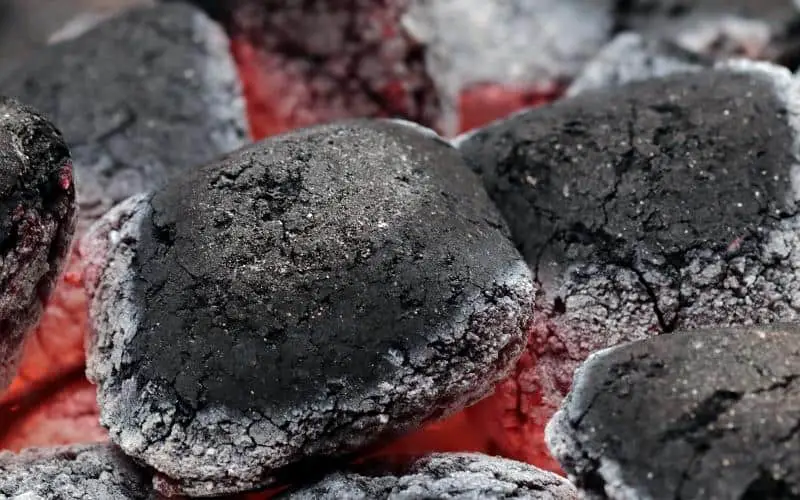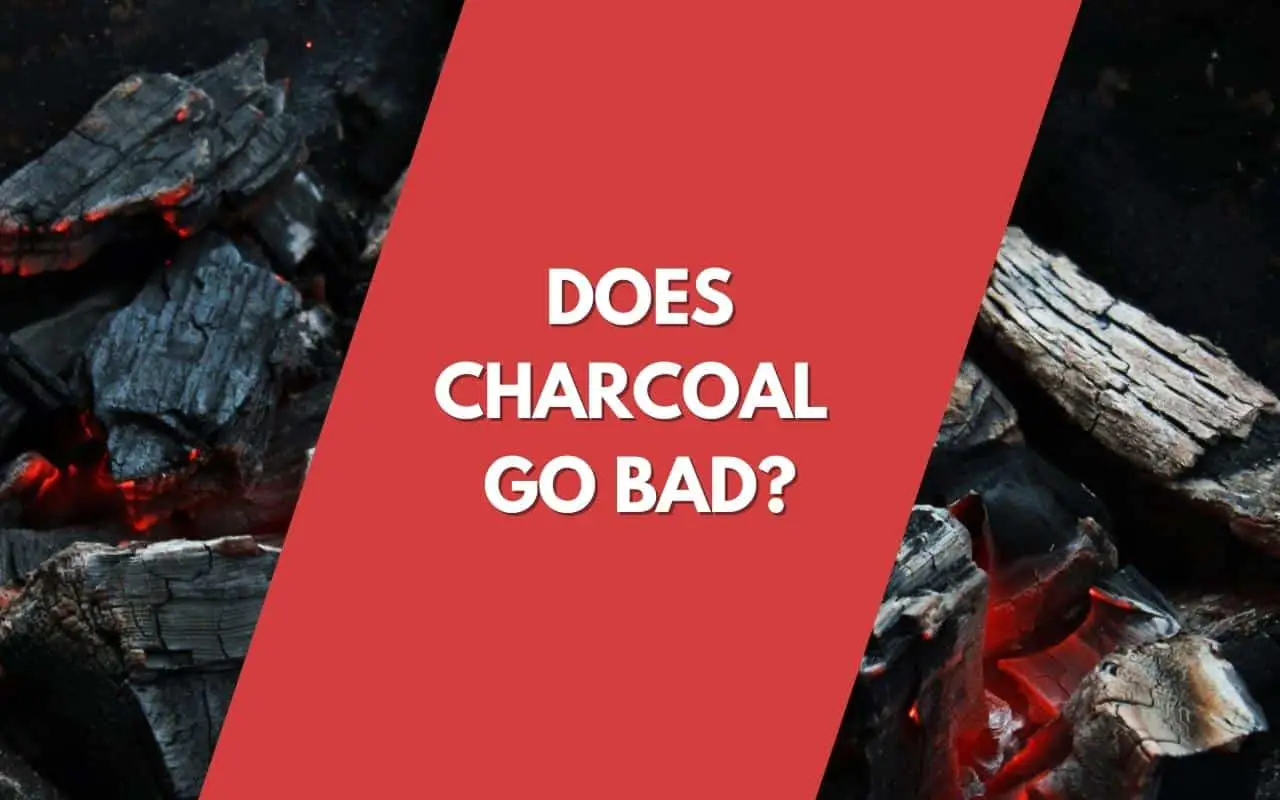When it comes to grilling, many BBQ lovers believe nothing beats the flavor of food cooked over charcoal. While gas grills are becoming more popular, there’s still something special about that smoky flavor you can only get from cooking with charcoal.
One of the common questions people are ask about charcoal is: Does charcoal go bad? I get it, you had your last barbecue in October and now it’s May and you’re wondering if you should throw away the rest of the charcoal or if you can still use it.
Charcoal doesn’t exactly go “bad” in the traditional sense of the word. There’s no “expiration date” or “use by” date stamped on a bag of charcoal. However, charcoal can go bad when it gets wet. Depending on the amount of moisture and the type of charcoal, it may or may not be usable.
Want to learn more about charcoal going bad and how to salvage wet charcoal? Then read on.
Table of Contents
- How Long Can You Keep a Bag of Charcoal?
- How to Store Charcoal?
- What Happens if Your Charcoal Gets Wet?
- Can You Use Wet Charcoal?
- What to Do with Wet Charcoal?
- Final Thoughts
- FAQ
How Long Can You Keep a Bag of Charcoal?
Charcoal has no expiration date, but it will slowly lose its properties over time due to moisture. If you keep the bag of charcoal sealed and keep it indoors, it will remain usable for years.
For the best results, you should use charcoal within six months to a year of opening the bag. After that, it’s still technically usable, but it will take longer to light and may not produce as much heat.
You can however prolong the charcoal’s life almost indefinitely if you store it properly. Preventing moisture from reaching the black chunks of heat-to-be is the key to keeping it fresh.
How to Store Charcoal?
The best way to store charcoal is just like you would store your griddle or grill – in a cool dry place.
Dry is the important part. Avoid leaving the charcoal bags outside, especially if you know it’s supposed to rain.
Even if it’s not raining, there is still moisture in the air. Indoors, the moisture levels are usually lower than outdoors. A good place to store charcoal is a garage or a garden shed.
You can also fight the moisture by placing the bags in an air-tight container. To take it even further, you can place a desiccant into the container as well. The desiccant will “consume” the moisture from the surrounding air.
Anyway, that’s perhaps a bit too much for most people. Just storing the charcoal in a dry place will usually suffice. Don’t buy too much charcoal at once and you won’t have to worry about storing it for prolonged periods.
What Happens if Your Charcoal Gets Wet?
When your charcoal gets wet, it’s not necessarily the end of the world. More often than not, even wet charcoal can be salvaged and used in an upcoming cookout.
This however depends on the type of charcoal and the amount of moisture that got into the bag. For example, briquette charcoal is more likely to be useless after getting wet than lump charcoal.
Lump or Hardwood Charcoal
This type of charcoal is made from hardwood that has been burned in a low-oxygen environment. You can say this is the traditional way of making charcoal. Many people prefer this type of charcoal because of that.
Lump charcoal is less prone to getting ruined by moisture than briquettes. This is because it is not as absorbent and holds its shape well even when wet. Thanks to that, lump charcoal can often be salvaged by letting it dry out completely. It may not be as good as new charcoal but it will still be usable.
Charcoal Briquettes

Charcoal briquettes have been around for some time now. They are usually made from byproducts such as sawdust and often contain other, not exactly healthy, materials and chemicals. These materials are compressed into pillowy-shaped briquettes.
There are also some healthier and more ecological options out there such as charcoal briquettes made from waste coconut shells.
Charcoal briquettes are more likely to get ruined if they get wet. Moisture will often turn them into dust rendering them useless. This however depends on the composition of the briquette and your mileage may vary.
Can You Use Wet Charcoal?
Just like you can use wet wood to start a fire, you can also use wet charcoal. However, it won’t be as easy to use as dry charcoal and it may take much longer to reach the same temperatures as dry charcoal.
One thing to keep in mind is that wet charcoal will initially produce a lot of white smoke when burning. That’s caused by the water content in the charcoal. The water will eventually evaporate and the smoke will dissipate as well.
As mentioned before, charcoal briquettes sometimes disintegrate into dust when exposed to moisture. Buying higher-quality briquettes may help avoid that to an extent.
If you want to use wet charcoal quickly, then I find it helpful if you can mix a bit of dry charcoal in with the wet. This will help to get things going.
What to Do with Wet Charcoal?
If you don’t need to use the charcoal immediately, then your best bet is to let it dry out. This may take a day or two, depending on how wet the charcoal is.
The easiest way to dry it out is to take it out of the bag a spread it on a flat dry surface. Old baking trays work well for this. Discard any pieces that look unsalvageable and only keep the most promising ones.
Leaving the charcoal in the baking trays out in the sun is one of the quickest options. However, you can also leave it to dry indoors in your garage.
Once the charcoal is dry, you can use it immediately or store it in an airtight container or a bag until needed.
Final Thoughts
Charcoal, in general, has a pretty much indefinite shelf life. Unless it’s exposed to moisture, it will last for years and years and work like new.
And even if it does get wet, there’s a good chance you’ll be able to salvage it and use it for your grilling session.
Keep your charcoal in a dry place, and you won’t ever need to worry about it getting bad on you.
FAQ
Does charcoal grow mold?
Although uncommon, charcoal can grow mold. This usually happens when the charcoal is stored in a damp environment. It’s more common with briquettes. If you notice mold on your charcoal, it is best to discard it to avoid any potential health hazards.
Can you reuse charcoal?
As long as the charcoal is still in good condition, there’s no reason why you couldn’t reuse it. It’s usually not possible to reuse briquettes as they quickly turn to dust. With lump charcoal, you may have better luck, especially if any larger lumps didn’t have the chance to burn to ash. That said, it’s often much easier to just get new charcoal.
Can I use expired charcoal?
Charcoal doesn’t really expire. As long as it’s not wet or moldy, you can use it without any problems.


